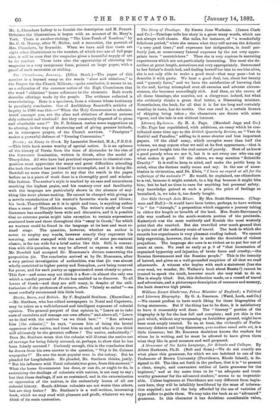The Story of Penelope. By Emma Jane Worboise. (James Clark
and Co.)—Penelope tells her story in a great many words, which are not always well chosen. She talks, for instance, of "a wonderfully felicitous period," when she means what they call across the Atlantic "a very good time ;" and expresses her indignation, in itself per- fectly just, at unnecessary funeral expenses by the not very appro- priate term " meretricious." Then she is very copious in narrating experiences which are not particularly interesting. Her meal she de- scribes at great length, sometimes not very appropriately. Summoned to her father's death-bed, and finding herself too late to see him alive, she is not only able to make a good meal—that may pass—bat to describe it with gusto. We hear a good deal, too, about her beauty and "queenly form," and we have the satisfaction of knowing that in the end, having triumphed over all enemies and adverse circum- stances, she becomes exceedingly rich. And then, as the crown of all these blessings, she marries, not a clergyman indeed, but what she evidently thinks a great deal better, a Dissenting minister. Nevertheless, the book, for all that it is far too long and certainly wanting in taste, has its merits. One can read it, a certain licence of skipping being taken ; the characters are drawn with some vigour, and the tale is not without interest.






































 Previous page
Previous page